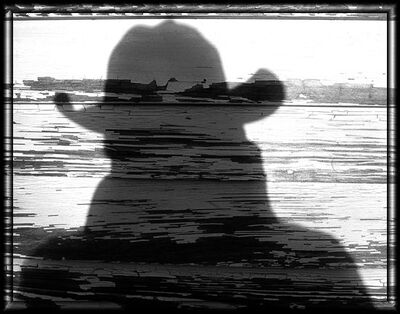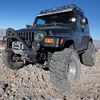polarizer
Oct 25, 2020 10:48:05 #
I bought a B&W recently for my 200~500mm. First filter I've bought in about 30 Years. The lens takes a 95mm filter and it was way more than I have ever spent for a filter. But it does the job in this burning Florida sunlight.
Oct 25, 2020 12:23:30 #
PoppieJ wrote:
I am looking for a polarizer. I currently have a Hoya that I am not thrilled with. looking for suggestions on what other UHHers use and why they like it
It would be helpful to know which Hoya and exactly what you find lacking.
Oct 25, 2020 12:28:21 #
Oct 25, 2020 12:37:27 #
CO wrote:
Many people on UHH mistakenly call B+W filters, B&W.
They're so used to typing B&H that B&W is just muscle memory.

I typed B&W last night, but I usually proof read my responses and caught it before I hit enter.

--
Oct 25, 2020 12:38:44 #
I rely on B+W for all of my filter needs. Keep in mind that the moment you fasten a filter to your lens, it becomes part of the optical system. Thus, avoid using a budget filter on an expensive lens.
--Bob
--Bob
PoppieJ wrote:
I am looking for a polarizer. I currently have a Hoya that I am not thrilled with. looking for suggestions on what other UHHers use and why they like it
Oct 25, 2020 12:43:41 #
User ID wrote:
...I’m thrilled by a few different PLs but I’m careful that none of them are aware of the others. I can definitely report that I have tended to ignore CPLs. Upon reflection, I observe that I just happen to prefer linear. Personal kink I guess ...
The reason that circular polarizers are used for digital cameras is because of reflections. Either linear or circular polarizers will reduce some reflections and darken some skies. A circular polarizer consists of a linear polarizer followed by a quarter wave plate. The quarter wave plate converts the linear polarized light to circular polarized light. Since the light passes through the linear polarizer first, the effect on skies and reflections will be carried through the quarter wave plate. Reversing the circular polarizer will make it act like a linear polarizer.
Autofocus in most digital cameras is done by a set of sensors that look at reflections off a mirror. Depending on the mirror, reflections will be affected by the polarization of light hitting the mirror. But circular polarized light looks just like unpolarized light in this application so the reflections will be unaffected. With linearly polarized light there is a possibility that the autofocus would not work properly.
This effect is generally not large, and most of the time there will be no significant effect of using a linear instead of a circular polarizer.
Oct 25, 2020 12:56:27 #
Carl1024
Loc: Kaneohe, HI 96744
2Filters.com
..........................................reply ends..............................................................
..........................................reply ends..............................................................
Oct 25, 2020 13:31:31 #
Wanderer2
Loc: Colorado Rocky Mountains
Although it's five years old the tests linked below is the best review of polarizing filters that I've seen. Among their top rated I've used both Marumi and Hoyas with good results. There can be, I believe, considerable difference in different models in the same lens maker's line and I recommend buying the top of the line in any manufacturer's selection. Other's do disagree on that.
Hope this is of some help.
https://www.lenstip.com/139.25-article-Polarizing_filters_test_2015_Results_and_summary.html
Hope this is of some help.
https://www.lenstip.com/139.25-article-Polarizing_filters_test_2015_Results_and_summary.html
Oct 25, 2020 13:32:45 #
I like the Lee filter system because I can stack filters and the polarizer is very large and covers all my lense without vignetting.
Oct 25, 2020 14:09:59 #
photoman43 wrote:
Consider getting a large diameter one, like 7xmm, with step down rings...
Step-down rings won't get the job done, step-up rings will.
Oct 25, 2020 14:21:01 #
CO wrote:
Many people on UHH mistakenly call B+W filters, B&W.
Thank you for catching that. THAT is reeeeeally grosse.
Hopefully they are all reading this thread ... except acoarst for the Hogster who’s gonna tell us that “+” is simply German for “&”. Ever catch them using commas for decimal points ? Tsk, tsk, silly schnitzel munchers ... (I’ll take a Jelly Doughnut myself, thanx).
I always chuckled at German accessories that came in a standard and a small or “junior” version. They use the word “boy” for “junior”. So you’d see a “Bulb Release” and a “Bulb Release Boy”, and/&/+ a “Lens Brush” and/&/+ a “Lens Brush Boy”. So, in Germany a Cabin Boy would be something like a Doghouse ?
How can we ever have global Fair Trade if foreigners refuse to speak American ?
Oct 25, 2020 14:37:25 #
amfoto1
Loc: San Jose, Calif. USA
PoppieJ wrote:
I am looking for a polarizer. I currently have a Hoya that I am not thrilled with. looking for suggestions on what other UHHers use and why they like it
Hoya makes a whole bunch of different polarizers.... some good... some, um, not so much.
B+W Circular Polarizers are the best value among high quality C-Pol.
I don't know what size you need, but for example here's what B&H Photo or Adorama are charging for some of the 77mm size C-Pols...
B+W 77mm XS-Pro C-Pol.... $104
B+W 77mm F-Pro C-Pol........ $90
Both of the above use high quality German Schott glass in brass frames, fine Kaesemann polarizing foils and are sealed for weather resistance. Both are also now "high transmissive", meaning they are a lighter shade of gray that reduces less light. Where a standard C-Pol typically "costs" between 1.5 and 2.25 stops of light, depending upon how strongly the effect is dialed in, the high transmissive instead reduce light by roughly .75 to 1.25 stops. The differences between the two are that B+W's better F-Pro is 8-layer multi-coated and uses their standard (but pretty low profile) brass frame, while the top-of-the-line XS-Pro is 16-layer nano multi-coated and uses a slimmer frame.
B+W actually makes two more C-Pol.... and "MRC" and an "SC". Their MRC is same as F-Pro, except it is a standard type of C-Pol, reducing 1.5 to 2.25 stops of light. It even costs the same $90. Their "SC" is a less expensive ($65) "single coated" filter that's more appropriate for studio use, where lighting can be more tightly controlled.
The "value" of B+W C-Pol... especially the top-of-the-line XS-Pro and the slightly lower spec F-Pro... is that they don't compromise at all on quality, but cost less than comparable quality filters from other manufacturers.
For example...
Heliopan 77mm High-Transmission C-Pol (virtually identical to B+W XS-Pro)... $205
Hoya 77mm HD3 C-Pol... $200
Zeiss 77mm T* C-Pol... $180
Sony 77mm T* C-Pol... $178
Heliopan 77mm Slim SH-PMC C-Pol... $170
Heliopan 77mm SH-PMC C-Pol... $160 (virtually identical to B+W F-Pro)
Hoya 77mm EVO Antistatic C-Pol... $156
Hoya 77mm NXT Plus Ci-Pol... $113
Above prices from B&H Photos. Below are some add'l brands with prices from Adorama.
Benro 77mm Master Series SlimHD C-Pol... $160
Breakthrough Photography 77mm X4 C-Pol... $149 (virtually identical specs as B+W XS-Pro)
Nikon 77mm Thin Ring C-Pol II... $149
Breakthrough Photography 77mm X2 C-Pol... $129 (similar to, but lower specs than B+W F-Pro)
Polar Pro 77mm QuartzLine C-Pol... $120
Marumi 77mm FIT+SLIM C-Pol... $100
NiSi 77mm Pro Nano Natural C-Pol... $99
So you can easily spend more... sometimes a lot more... than a good B+W C-Pol costs. But doing so almost never gets a better combination of features:
- Schott glass
- brass frame (low profile standard or extra slim)
- fine Kaesemann polarizing foils
- high transmissive
- weather resistance sealing
- multi-coatings (8-layer or 16-layer)
Multi-coatings are recommended for filters used outdoors, where you have less control over lighting. AFAIK, all the above listed filters have at least 8-layer coatings, which are fairly standard now. Newer 16-layer "nano" coatings are a bit more scratch, oil, dust and water resistant... easier to clean, too.
Slim filters may be needed for some ultrawide lenses, to prevent vignetting. Personally I've never had any problem with B+W's standard filter frames, which are lower profile than some other brands. I've never seen any vignetting using them on as wide as 17mm lenses on full frame and 10mm lenses on APS-C cameras. In four or five different diameters, I use a mix of older and newer B+W MRC, F-Pro and XS-Pro. I do like the new high transmissive with up to a stop less light lost to the filter. That can be helpful at times.
B+W also makes many other types of filters... such as Neutral Density or UV/Protection. Those are also very good quality, but are priced more similarly to other brands. So, while not a bad value by any means, those other types of filters don't stand out from the competition the way B+W's C-Pol do.
Oct 25, 2020 14:42:36 #
wdross
Loc: Castle Rock, Colorado
PoppieJ wrote:
I am looking for a polarizer. I currently have a Hoya that I am not thrilled with. looking for suggestions on what other UHHers use and why they like it
Manufacturers make different levels of quality. And Hoya's top level is as good as the top quality of any other manufacturer's top quality. Did you buy the multi-coated (5 layers or more) and nano finished?
During the film days, I "saved" money by buying a single layer coated filter. Very quickly I found out that single coated filters are easily scratched and start showing the effects of such in the photographic images. I then bought a top of the line filter back in the 1970's which still in good condition today (it may not meet today's standards, but still in good condition). A cheap filter is a cheap filter. A good filter is a good filter. Buy one of those expensive circular polarizer and save yourself money. Plus, it will produce much better results.
The brands that I like are B+W, Hoya, Breakthrough, and Marumi. But these are not the only great manufacturers. And no matter which brand you choose, buy their best multi-coated, nanotechnology filter.
Oct 25, 2020 14:57:04 #
wdross
Loc: Castle Rock, Colorado
PoppieJ wrote:
I am looking for a polarizer. I currently have a Hoya that I am not thrilled with. looking for suggestions on what other UHHers use and why they like it
Also, look at buying a polarizer that has a Kasemann design. Cost more, but they are not effected by moisture which can cause mold to develop in the lens.
Oct 25, 2020 15:34:33 #
PoppieJ
Loc: North Georgia
It seems that I did not give enough information in my original post. I am not sure which Hoya model I have. I just know that it appears to make my pictures soft. (like maybe the glass is not quite right) I am looking for a polarizer that will not soften my images. I would like this to be a one and done purchase. I mostly use polarizers to cut the glare on water
If you want to reply, then register here. Registration is free and your account is created instantly, so you can post right away.





